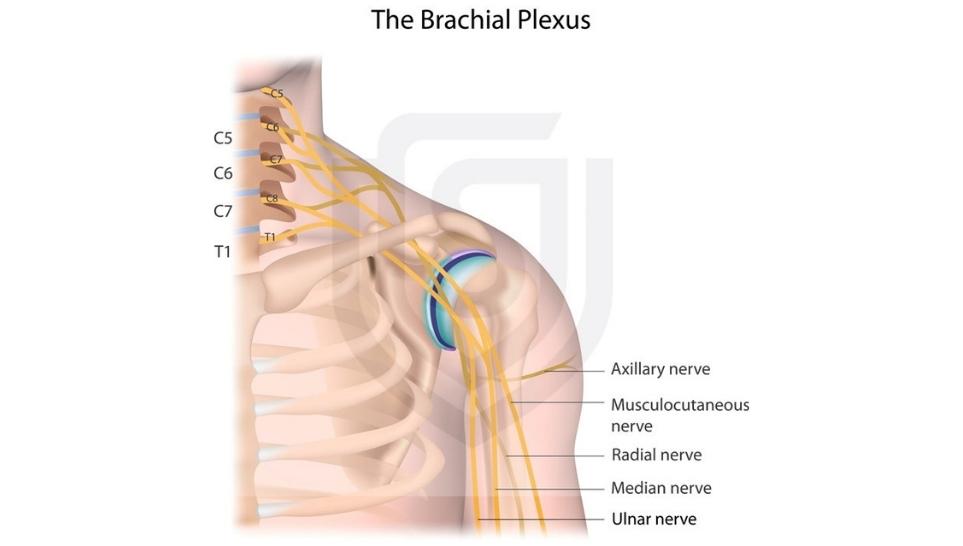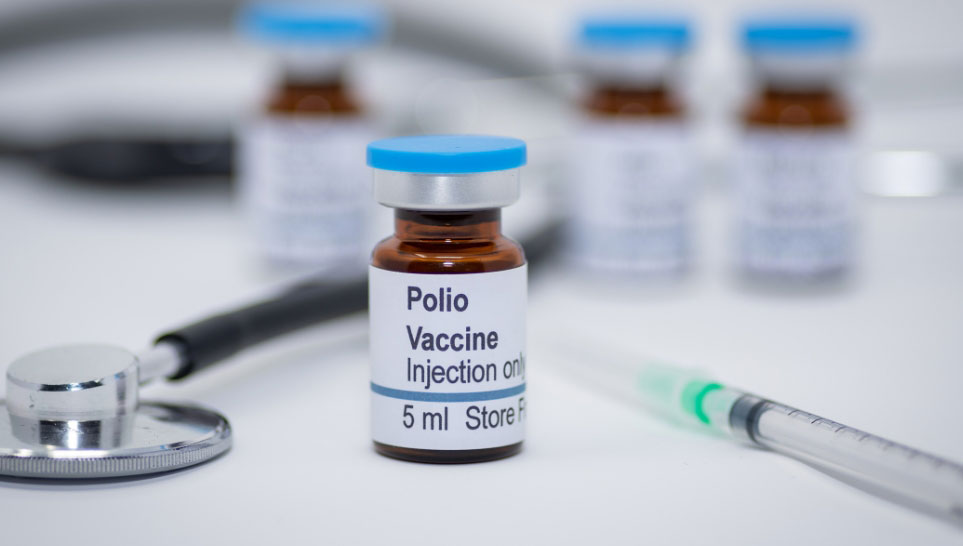
Is your shoulder or arm weak? Did you experience shoulder pain followed by weakness after receiving a vaccine? Then you may be suffering from a condition called Parsonage-Turner syndrome also known as brachial neuritis, brachial neuropathy, or neuralgic amyotrophy.
What is brachial neuritis?
Brachial neuritis is damage to one or more nerves in the brachial plexus. The brachial plexus is a bundle of nerves that run from the spine through the shoulder to the fingers.
Brachial neuritis is a type of peripheral neuropathy that damages the brachial nerves. Neuropathy is a fancy word used to describe a condition that causes pain or loss of function in the nerves that carry signals between the brain and the spine, and the rest of the body. In brachial neuritis, nerve damage occurs in the brachial plexus, an area between the spinal cord and the shoulder, arms, and hands.
Other medical terms to refer to brachial neuritis are brachial neuropathy, brachial plexus injury, Parsonage-Turner syndrome, or neuralgic amyotrophy. It is a condition that occurs suddenly without warning signs. Brachial neuritis symptoms mainly manifest in the nerves of the brachial plexus located in the arms and hands.
What are the types of brachial neuritis?
There are two types of brachial neuritis:
- Idiopathic brachial neuritis or acute brachial neuritis from an unknown cause. Acute brachial neuritis occurs unexpectedly and without a known (or recognized) cause. Symptoms usually start with shoulder pain. Sharp and intense pain in the shoulder, upper arm, below the elbow, or in the hand, which gradually turns into weakness is the most common course of illness. Most cases of vaccine-related brachial neuritis are labeled as “idiopathic” acute brachial neuritis.
- Brachial neuritis with a known cause. A brachial plexus injury is a form of neuritis caused by an injury. The pain and loss of function to the brachial plexus nerves manifest as symptoms of that injury. The brachial plexus’ damage can occur in multiple ways, such as sports injuries, car accidents, or injuries to babies passing through the birth canal.
How is brachial neuritis diagnosed?
Parsonage-Turner syndrome is generally diagnosed based on a person’s symptoms and medical history. A test called an EMG, which is a nerve conduction study, will be able to tell if there was damage to one of your nerves in the brachial plexus. Additional tests may be ordered to rule out other possible causes of the symptoms, such as a pinched nerve in the neck or shoulder.
What causes brachial neuritis?
Its generally accepted that brachial neuritis is caused by an abnormal immune response that can be caused by infection, injury, and vaccines. Acute brachial neuritis can just appear unexpectedly with no explanation.
Do vaccines cause brachial neuritis?
YES. Vaccines do cause brachial neuritis. It is well excepted that people who receive tetanus vaccines, like Tdap, and flu shots can develop brachial plexus injuries. The National Vaccine Injury Compensation Program recognizes brachial neuritis after tetanus vaccine as a known injury. The science is still developing concerning the role of other vaccines in the development of this peripheral neuropathy.
While most of the vaccine-caused brachial plexus neuritis cases are directly related to the tetanus vaccine, like Tdap or Td, other vaccines can cause a similar reaction, like the flu shot.
This is especially true for patients that have an adverse reaction to the following:
- Pertussis vaccine
- Diphtheria vaccine
- Flu vaccine
- Hepatitis B vaccine
What are the symptoms of brachial neuritis?
Severe pain. The initial pain of brachial neuritis is intense. This severe pain can be located in the upper arm or below the elbow. The pain usually manifests on only one side of the body.
Muscle weakness. Brachial neuritis can cause muscle weakness in the arm, hand, and fingers. The pain may subside after anywhere between a few hours or a few days and will slowly turn into a feeling of weakness, limpness, and, in some extreme cases, paralysis of the muscles in the arm or shoulder.
Numbness. You may feel numbness or tingling in your arm, hand, and fingers.
Loss of sensation. Loss of sensation and feeling in the arm and shoulder area. You may lose the ability to feel hot or cold temperatures or touch.
Loss of reflexes. Brachial neuritis can cause a loss of reflexes in your arm and hand.
What is scapular winging after brachial neuritis?
Scapula winging, or scapular dyskinesis, is a condition that can occur after brachial neuritis. This occurs when the muscles that control the shoulder blade (scapula) become weak or paralyzed. As a result, the shoulder blade may not move correctly and may stick out from the back. This can cause difficulty raising the arm or using the arm in other ways.
There is no cure for scapula winging after brachial neuritis, but treatment may help to improve symptoms. Treatment options include physical therapy, braces or splints, and surgery. With proper treatment, most people with scapula winging can regain some of their normal function.
How is brachial neuritis treated?
Since most of the symptoms of brachial neuritis tend to disappear on their own over time, the treatment generally has two approaches:
- Pain management for the patients until the symptoms subside.
- Surgery is an option for those whose brachial neuritis occurred due to an injury or an illness.
The pain management approach involves prescribing corticosteroids to increase pain tolerance in patients. Ideally, the pain will subside over time, and corticosteroid therapy can stop.
Patients who suffered extensive nerve damage in the brachial plexus due to an injury will have to undergo surgery to repair the brachial plexus area’s nerve damage.
On a side note, patients who suffer from brachial neuritis can make certain lifestyle changes and improvements in their diet to lessen the pain. A healthy diet and avoiding alcohol and cigarettes is a great start for some. Staying active and working with a physiotherapist should improve the condition as well. Many patients seek pain relief in relaxation methods, such as yoga and meditation.
FAQ
What is brachial neuritis, and what causes it?
The medical community generally accepts that brachial plexus neuropathy is caused by an abnormal immune response causing damage to the nerves.
The most common trigger of this abnormal immune response found in brachial neuritis patients is a viral infection, such as the flu. Other possible causes include:
- Bacterial infections
- Autoimmune disorders
- Injury to the nerves in the shoulder or neck
What are the treatment options for brachial neuritis?
Treatment for brachial neuritis depends on the severity of the condition and how much it is impacting a person’s life. In some cases, rest and over-the-counter pain medications may be enough to ease symptoms. Physical therapy may also help. More severe cases may require corticosteroid injections or surgery.
Brachial neuritis can be a painful and debilitating condition, but many people make a full recovery with proper treatment.
If you suffered an injury to your arm or shoulder after receiving a vaccine, then you need to immediately see your doctor. The doctor will note your symptoms and check your muscle strength, reflexes, and feeling in your arm. Suffering from intense pain in your arm followed by a sudden onset of weakness can change your life. We can help you get the life back you lost.
Brachial neuritis caused by vaccines is compensable through National Vaccine Injury Compensation Program, and you could qualify for compensation.
Reach out to our vaccine injury team at Sadaka Law. We have years of experience working in the vaccine injury compensation program, and we will help guide you through the process of applying and claiming compensation from the NVICP.
BRACHIAL NEURITIS AFTER MULTIPLE VACCINES
$250,000 settlement for adult male who suffered from brachial neuritis after receiving influenza, Tdap, meningococcal, hepatitis A, hepatitis B, IPV, and MMR vaccines.
BRACHIAL NEURITIS AFTER FLU VACCINE
$60,000 settlement for adult female who suffered from brachial neuritis after influenza vaccine.
BRACHIAL NEURITIS AFTER TDAP VACCINE
$85,000 settlement for adult female who suffered from brachial neuritis, brachial plexus and shoulder injury after receiving a TDaP vaccine.
BRACHIAL NEURITIS AFTER MULTIPLE VACCINES
$250,000.00 settlement for a 19 year old man enlisted in the army, who developed brachial neuritis as a result of receiving the influenza vaccine, tetanus diphtheria accellular pertussis or Tdap vaccine, meningococcal vaccine, hepatitis A and B vaccines, polio inactivated or IPV vaccine, and measles mumps and rubella or MMR vaccine.
BRACHIAL NEURITIS AFTER FLU VACCINE
$60,000.00 settlement for a NY woman who developed brachial neuritis as a result of receiving the influenza vaccine.
BRACHIAL NEURITIS AFTER TDAP VACCINE
$67,500.00 settlement for a 47 year old woman from Michigan who developed brachial neuritis as a result of receiving the tetanus-diphtheria-acellular pertussis, Tdap vaccine.
BRACHIAL NEURITIS AFTER HEPATITIS B VACCINE
$60,000.00 settlement for a 31 year old male from North Carolina who developed brachial neuritis and shoulder pain as a result of receiving the hepatitis B vaccination.
BRACHIAL NEURITIS AND SIRVA AFTER TDAP VACCINE
$31,490.02 settlement for a 42 year old woman from Michigan who developed brachial neuritis and a shoulder injury related to vaccine administration or SIRVA as a result of receiving the tetanus-diphtheria-acellular pertussis or Tdap vaccine.
MULTIPLE INJURIES AFTER FLU AND TDAP VACCINES
$85,000.00 settlement for a young women from Colorado who developed nerve damage, brachial neuritis, brachial plexus and shoulder injury, chronic myofascial parascapular pain, depression, and anxiety as a result of the influenza and TDaP vaccinations.





